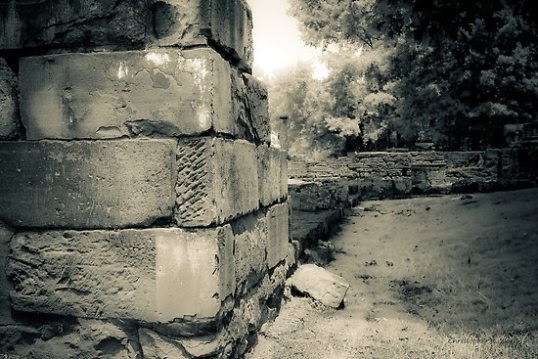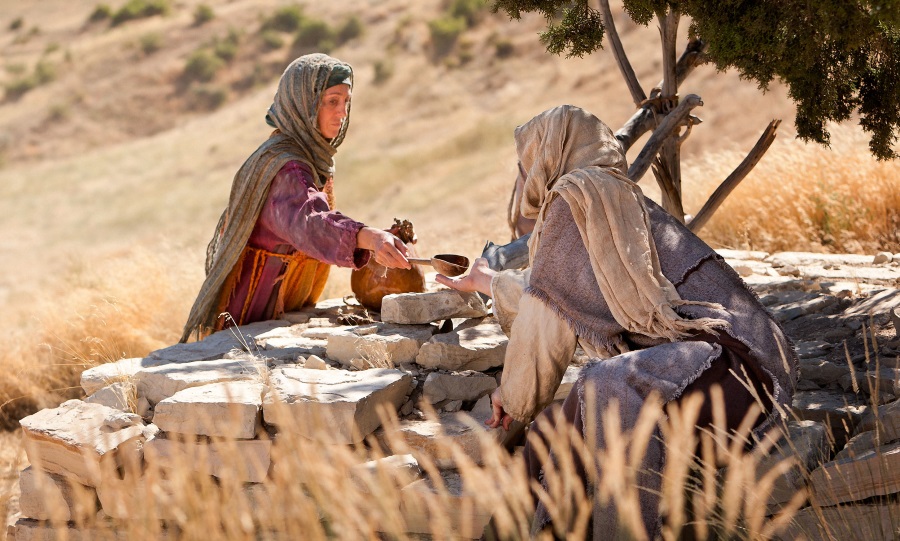 Read some of our Latest articles.
Read some of our Latest articles.
The word “ghetto” comes from the word “geto” or “copper foundry.” It was the name of a Venetian island on which such a foundry was once located. In 1516 the Jews of Venice were removed to this Island. During daylight hours the Venetian Jews, so vital to the economic life of the city state, were allowed to circulate among the general population. But at the end of the work day, the Jews were required to return to the island, and the gated enclave assigned to them there.* The result was that the Jews of Venice, in their walled enclave, enjoyed a cleaner, safer existence than their free-range, gentile counterparts. Their culture thrived, their families prospered. In their separation, though, they had little cultural influence on their city. They certainly made no proselytes – not that any were trying.
The Venice ghetto is separated from the Warsaw ghetto Hitler established by four and a half centuries and by a gulf like the one that separates heaven and hell. Both were products of antisemitism and hate, but the Venetian ghetto was an experiment in co-existence while the Warsaw ghetto was a tool of genocide. If a person had to choose which ghetto to call home the choice would be an easy one.
But should one want to live in any ghetto?
The Venetian ghetto had many attractive qualities. It put a wall between Jews and a culture hostile to them. It allowed them keep their culture unpolluted, their streets unpolluted, their families unpolluted. For the Venetians, the ghetto allowed them to benefit from the talents of their Jewish population without having to socialize with Jews.
Many of us Christians rather enjoy such an existence.
I’ll never forget the day, back in Rome, Ohio, that I first recognized the Christian ghetto. We had received, at the office, one of those phone books that include only “Christian” businesses. The cover advertised a new section which featured “Christian” dance and fitness classes. One could find “Christian” waltz classes, line-dance classes, swing-dance classes, pilates classes, yoga classes, even tango classes (probably not the “Argentine” tango, but who knows?). In that phone book one could find the walls of a Christian ghetto. I have no doubt the publishers of the phone book just wanted to get information out, and help Christian businesses. What happened, though, was that many Christians found it helped them live within walls that kept the “Gentiles” out.
The Christian ghetto is this insulated space we create for ourselves.
First Century Christians neither had access to such space, nor did they seek it. Jesus said, Let your light shine before men in such a way that they may see your good deeds and glorify your Father who is in Heaven (Matthew 5.16). He prayed to the Father on our behalf, they are not of the world, even as I am not of the world. I do not ask that You to take them out of the world, but to keep them from the evil one (John 17.14-15).
Peter, who heard Jesus pray this prayer, instructs us: Keep your behavior excellent among the Gentiles, so that on account of the thing in which they slander you as evildoers, they may, on account of your good deeds, glorify God on the day of visitation I Peter 2.12.
Both Jesus and Peter draw a connection between our being among non-Christians and God being glorified. Nowhere does the New Testament envision this glory being generated in the Christian ghetto.
Mel Hurley, David Binkley, Alfred Huff, and Jack Powers these last three weeks all made this very point – and quite independently of each other. I detected in these sermons not a coincidence but a theme. It is a theme God makes clear in His word. As Jesus said, a city on a hill cannot be hidden (Matthew 5.14). The world would love us to go politely behind the walls of our ghetto and keep to ourselves. We often find that appealing too. Life in the Christian ghetto is certainly easier. But it is not what God has in mind.
*From “The Eviction Curse,” by Patrick Sharkey, in The Atlantic, June 2016, pp. 34-35
The stone which the builders rejected became the very cornerstone. Psalm 118.22 (I Peter 2.7)
A stone of stumbling and a rock of offense....Isaiah 8.14 (I Peter 2.8)
In I Peter 2.4-10 the apostle tells us there are two ways of rejecting Jesus: to reject Him after consideration, and to overlook Him altogether and stumble. Both are fatal.
The larger passage begins in 1.22 where Peter reminds us that we mortals have been given immortality since our souls have been “purified.” He continues in Chapter 2.1 to tell us that since this is the case we have to move forward and build a new life. We must put away old habits and like “newborn babies, long for the pure milk of the world.” In 2.4 he tells us that we begin building this new life by laying a cornerstone. A cornerstone sets the line for all three dimensions of the house we are to build, and establishes as well the soundness of all the construction that follows. We receive a cornerstone from God Himself, Peter reminds us (2.6, quoting from Isaiah 28.16). This stone is “carefully chosen,” and “precious.” Of course the cornerstone is not an actual stone, it is a “Him” (v. 4) - it is Christ. In verse 7 he tells us that only those who believe will perceive the value of the stone. Those who do not believe can be divided into two categories: those who consider then reject the cornerstone, and those who overlook it and take a tumble.
Peter then quotes the two Old Testament passages cited above. In verse 7 he quotes Psalm 118.22, which states that the chief cornerstone was rejected by the builders. Some will truly consider all that Jesus teaches and reject Him anyway. In verse 8 he quotes Isaiah 8.14 which describes the stone as a cause of “stumbling,” and “offense.” These two words are interesting. The word translated “offense” is the same word translated “stumbling block” in I Corinthians 1.23. It originally described the tripwire or spring of a trap. The word “stumbling” describes tripping over a stone or impediment in the road. Both words describe the unexpected – the surprise that causes a fall. Some will completely disregard Jesus to their own demise.
In the New Testament we see Jesus rejected in both ways. Some consider Him carefully and say, “This is not the Messiah we’re looking for.” The various groups which made up the religious establishment in Jesus’ day - Pharisees, Sadducees, Scribes, experts on the law, the priesthood - all rejected him in turn, after investigation.
Others – Pilate, Herod, even Saul before his conversion (see I Timothy 1.13), overlooked Jesus. Their unbelief was a result of willful ignorance.
Which rejection is worse? One could argue that to really examine the evidence and then reject Him is unthinkable. Only a truly obdurate and rascally person would do that. One also might argue that showing no interest in the truth at all is a greater act of disrespect than learning it and rejecting it.
Rejecting the stone either way results in downfall. To discard the one true cornerstone for something inferior is to build a house that will not stand. To disregard the stone is to stumble over it to our own destruction.
We recognize more readily the former. Those who name Jesus and reject Him are more visibly opponents of the Gospel. But any of us who go through an hour, a day, a year, a lifetime without giving Him any serious thought (although we may give Him a lifetime of lip-service), have rejected Him just as thoroughly. Our demise will be thorough as well.
The passage concludes by reminding us who we are. Quoting Deuteronomy 10.15, and Hosea 1.9-10, Peter reminds us we: a chosen race, a royal priesthood, a holy nation, a people for God’s own possession. We once were “not a people,” but now are the very people of God. Once we “had not received mercy,” but now we have. This is a lot to consider, and accept. Let us do both – every day.
In John 12 Mary of Bethany interrupts the dinner party given in Jesus’ honor at Simon’s house to anoint his head and feet with pure nard. This perfumed resin cost a year’s wage. Mary broke the neck of the bottle containing the nard so that it could not be saved (Mark 14.3). The entire house was filled with the fragrance of it. In order to work the perfumed oil into Jesus feet, and to remove the excess, Mary wiped Jesus’ feet with her hair. This act was so outrageous, so intimate that it upset the others at the dinner party. Judas openly complained about the waste of money. Jesus defends Mary, explaining that she has anointed Him ahead of time for his burial. He does more than defend her, he celebrates her. He demands that wherever the Gospel is preached Mary, and her kind gesture is to be remembered (Mark 14.7-9).
This gesture is so intimate that we had a hard time staging it for Vacation Bible School last summer. We made sure we got a husband and wife to play Jesus and Mary because we would not ask a woman to wipe a random man’s feet with her hair. We made sure we asked a newly wedded couple because we doubted most married women would agree to wipe their husband’s feet with their hair. Luckily we had a couple who were just married to play the roles of Jesus and Mary. They carried off the scene perfectly. It was startling to behold. Seeing it in person – how shocking this gesture is, and understanding that those first century Jews were closer culturally to fundamentalist Muslims than to us jaded Westerners – emphasized dramatically the radical nature of the moment.
It wasn’t the first time something like this had happened to Jesus. Earlier, at the home of a Pharisee (also named Simon) a prostitute interrupted dinner to weep at Jesus’ feet (Luke 7.36-50). She bathed Jesus’ feet with her tears and wipes them with her hair. Simon, an important Pharisee was insulted at this intrusion, and thought that if Jesus were truly a prophet he would know what kind of woman was taking such liberties. Jesus defended the woman, explaining that she is only showing gratitude for the forgiveness she has been given. He exposed the way Simon has mistreated him, refusing him basic hospitality, and compared that treatment with the radical devotion of this unnamed prostitute.
In both instances we see women bravely breaking society’s rules to express their gratitude and devotion to Jesus. Jesus receives and appreciates these gestures. Jesus is also careful to fully explain the significance of both gestures, and make clear His appreciation of them. He wants to make sure we understand that both women are sincere. Their gestures are as natural as a sunrise. We need to take notice, to learn, to follow.
There is something else. Jesus is wholly unconcerned about our uneasiness. It is almost like He is saying, “This makes you uncomfortable? Well grow up!” If we cannot appreciate the purity and beauty of these women who, for different reasons wiped Jesus’ feet with their hair – even after Jesus carefully explains everything – we are beyond Jesus’ patience. Jesus is not going to accommodate our narrowness. He is not going to hide these gestures, nor ask these ladies to tone their acts of devotion down.
No. Both women are in the Gospel record. God made sure of it. In Mary’s case Jesus says her act of kindness should be part of the preaching of the Gospel wherever the Gospel is preached. We cannot avoid them. Every Gospel has one of these stories. Gratitude and devotion will naturally produce radical, unashamed acts of kindness. When this happens Jesus notices, understands, and is glad.
Do we have a problem with that?
The Jews answered and said to Him, “Do we not say rightly that you are a Samaritan and have a demon?” John 8.48
The Jews are violently enraged at Jesus in John 8, so much so that they try to stone him. Jesus has made clear He is the Son of God - that He is God. Jesus has so thoroughly answered their arguments the only tools left to them are name calling and violence. They call Jesus a Samaritan, and say he has a demon. He has been accused of having a demon before, but being called a Samaritan is a new charge. Why would they say that? Earlier in the confrontation the Jews clearly acknowledge that Jesus is a Galilean (John 7.52). Of course calling Jesus a Galilean is a way of calling him a “hick”. Calling him a “Samaritan” seems to be a way of hurling a greater insult at Jesus.
John has already told us Jews have no dealings with Samaritans (4.9). The racial hatred and strife between the two peoples was intense and real. When they tag Jesus a “Samaritan,” they are not just pulling an awful name off the shelf. Jesus does have dealings with the Samaritans. He spoke at length with a Samaritan woman at Jacob’s Well, and spent two days in her village teaching the people (John 4.1-42). He also told stories about Samaritans who were moral, noble and caring (Luke 10.25-37). We have heard enough racial slurs to know why they call Jesus a “Samaritan.” He is, to them, a “Samaritan-lover.”
Of the two charges they make against Him – that he is a Samaritan, and has a demon – Jesus answers only the second. He makes no comment on the first. “I do not have a demon!” He answers the second charge in verses 49-51, “I honor My Father…I do not seek my own glory.” But to the charge of being a Samaritan he answers not a word. Why?
It might be that Jesus refuses to dignify a racial slur with a response. Some evil, like racial prejudice, is based in stupidity, and stupidity has to be subverted. “Do not answer a fool according to his folly lest you be like him,” (Proverbs 24.6). You cannot wrestle in the mud with anyone without getting muddy yourself. One must stand up to evil, but stupidity has to be subverted.
It might be that if they are actually calling Jesus a “Samaritan lover,” no answer is necessary, because He is.
Or it might be that Jesus makes no response to the charge because it is true. I am not arguing that Jesus has Samaritan DNA in his cells. His lineage is more solidly documented than any Jew of His era (see Matthew 1, and Luke 3). But the Bible makes clear that when Jesus hangs on the cross as our atoning sacrifice, He hangs there as a Jew, a Samaritan, a Gaul, a Hun, an Ethiopian, a Malay, a slave, a free man, a man, a woman.
For He Himself is the atoning sacrifice for our sins; and not for ours only, but for the sins of the whole world. I John 2.2
For all of you who were baptized into Christ have clothed yourself with Christ. There is neither Jew nor Greek, there is neither slave nor free man, there is neither male nor female; for you are all one in Christ. Galatians 3.27-28.
“We were right when we called you a Samaritan,” the Jews taunt Jesus. As we read that passage in David Binkley’s fine class on the Gospel of John last Sunday, I wished I could have been there and said, “Yes. Yes you are. You are right. And if you knew why you are right, you would finally understand.”
 A few years ago the actor and activist Michael J. Fox wrote a memoir of his life after receiving a diagnosis of Parkinson’s disease. His courage in the face of this debilitating disorder has been an inspiration. The title of his memoir, Lucky Man, calls to mind another celebrity associated with another terrible disorder. Lou Gehrig, whose name so represents Amyotrophic Lateral Sclerosis (ALS) that almost everyone knows it as “Lou Gehrig’s Disease,” famously ended his farewell to the fans at Yankee Stadium in 1939 by declaring, “Today, I consider myself the luckiest man on the face of the earth.” Gehrig meant what he said. The gratitude in his voice was unmistakable. Both men use the word “lucky” to mean blessed.
A few years ago the actor and activist Michael J. Fox wrote a memoir of his life after receiving a diagnosis of Parkinson’s disease. His courage in the face of this debilitating disorder has been an inspiration. The title of his memoir, Lucky Man, calls to mind another celebrity associated with another terrible disorder. Lou Gehrig, whose name so represents Amyotrophic Lateral Sclerosis (ALS) that almost everyone knows it as “Lou Gehrig’s Disease,” famously ended his farewell to the fans at Yankee Stadium in 1939 by declaring, “Today, I consider myself the luckiest man on the face of the earth.” Gehrig meant what he said. The gratitude in his voice was unmistakable. Both men use the word “lucky” to mean blessed.
Edward Kennedy “Duke” Ellington is not associated with any particular disorder or disease (although he did die of Lung cancer). He lived a seemingly charmed life, despite facing entrenched racism every day. In 1955 Duke Ellington told Edward R. Murrow that his success and longevity was due to “85% luck.” Duke, at the time, was at the height of his powers, his reputation had never been greater, and his life seemed to be an unfurling ribbon of prosperity and achievement. He attributed this to luck – the randomness of good fortune.
Sportscasters often remind us it is “more important to be lucky than good.” The Bible says something surprisingly similar. Ecclesiastes 9.11 states: The race is not to the swift, nor the battle to the strong, nor bread to men of wisdom, but time and chance happen to all.
I am a lucky man, myself. Last year, in this very space I wrote a piece demonstrating that the odds of winning the lottery are better than the odds of enjoying all the blessings I have been given (health, American citizenship, Christian upbringing, stable home, advanced degree, et cetera). These blessings are from God, as is every good and perfect gift (James 1.17). This makes me deeply grateful and profoundly afraid. I am grateful because none of it is deserved. I am afraid because I feel things will eventually even out - as my old dominoes buddy, Maggie Burcham used to say, “There is a board waiting for every behind.” I wonder if receiving such an abundance of blessings is a product of chance, or of intention. Have I been lucky or have I been blessed?
Either alternative is problematic. It is hard to think that something like pure luck even exists in a world where the fall of a single sparrow is noted by God (Matthew 10.29). In fact the word translated “chance” in Ecclesiastes 9.11 describes unforeseen factors, not randomness. It describes the limits of human perception, not the chaos of the universe. However, if I am blessed, not just lucky, what does that say about God’s fairness? I am not a particularly good person. Why have I been given so much? Why do others suffer so?
Jesus, interestingly, uses the weather to explain God’s blessings, and His love of his enemies (Matthew 5.45). God causes the rain to fall on the just and the unjust equally. Does this mean that God orders each rainfall, or that He set in motion a meteorological system that doesn’t morally discriminate?
Whatever Jesus means, He gives us a handle on the question of luck by using the weather to explain blessings. Weather is so complex that it has yet to yield itself to our mathematics. We are better at predicting it than we used to be – but the 7 Day Forecast on your evening news is no more accurate than the Old Farmer’s Almanac. Think of all the possible paths we are shown every time a hurricane forms in the Atlantic. Hour to hour we are guessing. We cannot manage the weather, nor alter it – or even predict it with much accuracy. Maybe what we call “luck” isn’t random at all. Maybe the rubric of life and blessing is so complex that it looks like chaos to a finite human mind.
Despite that complexity, simple truths emerge we cannot ignore. God knows. God reigns. God blesses. We know He is the source of every good thing. We know to be thankful, and to say so. What else do we need to know?







